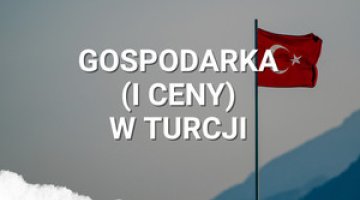Turkey – USA: a deal despite differences?
US president Donald Trump and his Turkish counterpart, Recep Tayyip Erdoğan, met for the first time on 16 May in Washington. The issues they discussed included: the US policy on Syria and support for Syrian Kurds from PYD (who have links with the terrorist PKK); broader regional issues; and Turkey’s efforts to extradite the Turkish spiritual leader Fethullah Gülen who lives in the US and who, in Ankara’s opinion, is responsible for the unsuccessful coup of 15 July 2016. The Turkish delegation included ministers in charge of foreign affairs, energy and justice. Additionally, Erdoğan’s closest aides had been in the USA one week before Erdoğan’s visit: General Hulusi Akar, the head of the general staff; Hakan Fidan, the head of Turkey’s most important secret service (MIT); and İbrahim Kalın, Erdoğan’s influential spokesman.
Very little information has been disclosed on how the talks were conducted. Erdoğan spoke of a ‘global agreement’ achieved at a press conference, while simultaneously continuing his criticism of the US support for the Kurdish Democratic Union Party (PYD) in Syria. Trump, in turn, expressed his will to improve US-Turkish relations and declared support for Turkey in combating Islamic State and the Kurdistan Workers’ Party (PKK). No joint declarations were made during the meeting concerning a compromise in the most disputed current issues, such as support for PYD or Gülen’s extradition.
The media in the context of the visit widely publicised an incident in front of the Turkish embassy in Washington, where supporters of President Erdoğan gathered and, with the participation of Erdoğan’s bodyguards, beat up participants of a protest held by Kurdish and Armenian organisations. The incident was greeted by a stern reaction from the US side (the Turkish ambassador was summoned and critical statements were made by some politicians).
Commentary
- In spite of their institutional alliance as part of NATO, US-Turkey relations have been tense since the end of the Cold War. In the past the foundation of the strategic community was the need to defend against Communism. Meanwhile, the Turkish and the US visions of the regional order have diverged over at least the past twenty years. One example of this is the Turkish protest against the US intervention in Iraq in 2003. The conflict of interest in Syria, and more precisely the US policy of supporting PYD, along with the Gülen issue, have been the main elements of dispute between the USA and Turkey over the past few years. From Ankara’s point of view, Washington is offering direct support to forces that are hostile to Turkey, thus not only failing to perform the role of the strategic guarantor of security but also becoming a potential threat. In turn, the USA views Turkey’s policy as unpredictable, and its transactional co-operation with Russia and occasionally with Iran makes it a problematic if useful partner.
- It may be concluded from the general background, from statements drip-fed to the press and from negative reactions from PKK and PYD that US and Turkey have most likely achieved a general compromise. It most likely envisages anti-Iranian co-operation in the Middle East in the strategic dimension, while maintaining different stances on issues in dispute. This above all concerns curbing Iranian influence in Iraq and to a lesser extent in Syria. In turn, in tactical terms, Turkey accepts the presence of PYD in Syria in exchange for upholding US guarantees that this organisation will not use Syrian territory for any moves against Turkey. It also seems likely that the US has granted consent to the Turkish operation against PKK in Sinjar, Iraq. PKK’s presence in this region was criticised by Washington and the government of Iraqi Kurdistan (which is in conflict with PKK) in the past.
- It is likely that the deal, being an attempt to reset the problematic bilateral relations, will not put an end to the tensions between the USA and Turkey. The deal is only partly satisfactory to the Turkish side. Ankara had pinned great hopes on the change of the US administration and Erdoğan’s first visit. One proof of this is the scale of preparations for the visit, including the earlier arrival of the chief of staff and the head of MIT. A number of disputed issues which are of key significance for Ankara remain unresolved. The most important of these include US support for PYD and the issue of Gülen’s extradition. The deal is rather vague, and possible US-Turkish co-operation will be limited to specific issues. Each time the conditions of co-operation between Ankara and Washington are agreed in more detail, additional tension and turbulent negotiations may be expected. One example is provided by Turkey’s demand to dismiss the US Special Presidential Envoy for the Global Coalition to Counter Islamic State in Syria and Iraq, Brett McGurk, due to his extensive support for PYD.
- The deal with Turkey fits in with the general change of the US policy towards the Middle East. The Republican administration in the White House views Iran as the greatest threat to the interests of the US and its allies in the Middle East. Washington’s new policy envisages strengthening Sunnis in the region, which would enable its future stabilisation and restrict Iran’s influence. At the same time, the most important partner for the US in this context is not Turkey but Saudi Arabia, which is Iran’s main rival in the region. Additionally, Saudi Arabia has financial and political potential and readiness for military activity; for example, it is already engaged in a direct military operation against Iranian proxies in Yemen. The intensified US engagement in the Middle East in exchange for Saudi support for the US economy is becoming the main axis of co-operation between Washington and Riyadh (the value of the contracts signed during Trump’s visit to Riyadh totalled around US$300 billion). From this point of view, Ankara’s role in Washington’s new policy is secondary and limited to Turkey’s immediate neighbourhood, in particular, Iraq.





